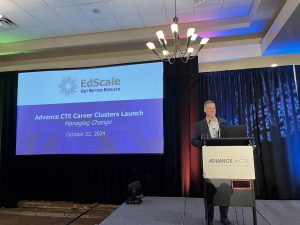 At the 2024 Fall Meeting in sunny Phoenix, AZ, Advance CTE unveiled the long-anticipated modernized National Career Clusters Framework® (the Framework), which provides structural alignment and a common language to bridge education and work, empowering each learner to explore, decide, and prepare for dynamic and evolving careers.
At the 2024 Fall Meeting in sunny Phoenix, AZ, Advance CTE unveiled the long-anticipated modernized National Career Clusters Framework® (the Framework), which provides structural alignment and a common language to bridge education and work, empowering each learner to explore, decide, and prepare for dynamic and evolving careers.
In anticipation of the multi-year implementation process for Career Technical Education (CTE) leaders and state teams, we invited Thomas DeWire, Founder and Principal Consultant of EdScale, LLC, to discuss change management and effective implementation. For over two decades, Thomas has worked with states, districts, schools, and education-focused organizations to get better results through a relentless focus on effective implementation.
Prioritize Your Goals
During the Managing Change plenary session, Thomas shared promising implementation practices from his book How to Implement (just about) Anything, which provides succinct steps for proactive planning and controlled execution. Beginning with his first lesson, Thomas advised participants to consider the scope of their implementation plans.
Thomas states, “I have experienced the dense state/district/school improvement plans. The kitchen sink approach to school improvement. That doesn’t work. Instead, what are a couple of things that are changing that we will implement systematically?”
Key considerations:
- Select three to seven priorities for implementation planning
- Avoid “fat plans” that tend to scope creep and dilute the focus or result in partially achieved goals
- Ground your priorities in reality
Build Strong Guiding Coalitions and Teams
Thomas emphasized the importance of making these prioritization decisions with their guiding coalition and implementation team—the team members and advocates who will move this work forward—in mind.
“The guiding coalition will advocate, support, guide, and give you valuable feedback…Then, you need an implementation team. Who are the people doing the work?” Thomas asks.
He provides a grid to gauge external partners’ ability to influence outcomes and identify who should be at the table for initial strategy planning through the execution (Figure 1).
Figure 1. Prioritize external partners by mapping their ability to influence outcomes and current interests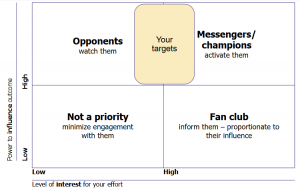
Start Early and Create Capacity
After establishing who the folks in the guiding coalition and implementation team are, Thomas advised to start routines early and create capacity to avoid building the plane while it’s flying. This looks like building feedback loops to drive improvement and proof points to highlight quick wins.
“We get feedback, correct it, and then celebrate! We spend more time on the things that are broken than the things that are working. If we flip that, we’d see outsized and incredible results.”
Stay Consistent and Plan for Solutions
Small and consistent victories compound over time. Thomas shared a model (Figure 2) of how teams can envision an aligned, coherent, lightweight, and effective implementation infrastructure to achieve project priorities.
Figure 2. Effective implementation infrastructure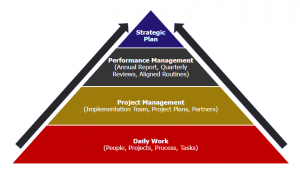
With a now full toolkit to implement the Framework, Thomas cautioned us about obstacles our teams may encounter when putting plans in motion. These include complacency, weak leadership coalitions, insufficient communication, and failure to create short-term wins. However, incorporating the learnings from the session has equipped leaders to stay focused on prioritized goals, build strong guiding coalitions, create feedback loops for continuous improvement, and celebrate small victories to maintain momentum and drive successful implementation.
Thomas ends with the following:
“You’re the only people in your state who can create alignment and coherence around the Modernized Career Clusters. Creating a short-term lens and thinking about what might be possible builds momentum, bringing other people along with you. It’s not that we don’t know how; it’s not that we don’t have the talent to do it; it’s that it’s really hard to scale it… The goal, the challenge, is to actively facilitate change–to create clarity, alignment, and coherence to get better results for students.”
Advance CTE will continue to have opportunities for states to engage in Career Clusters Framework Adoption & Implementation. Our Resources webpage will continue to be updated with materials for implementation at state and local levels, crosswalks, and communication tools to help leaders at every level assess, adopt, and implement the Framework at their pace and capacity.
Please reach out through our Contact Us form or via email at [email protected]
 Marie Falcone, policy associate
Marie Falcone, policy associate


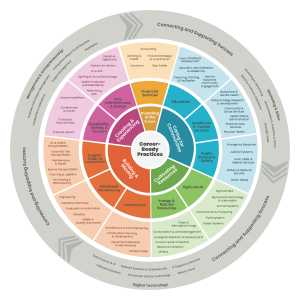
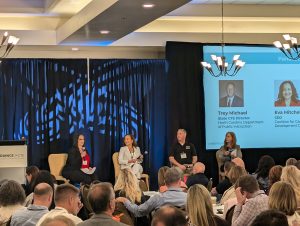

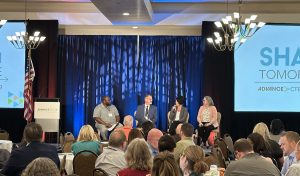 Advance CTE recently held a panel on engaging employers at this year’s Fall Meeting, bringing together experts from education, industry, and workforce development to discuss how we can better align education and industry needs, create impactful partnerships, and prepare learners for the careers of tomorrow.
Advance CTE recently held a panel on engaging employers at this year’s Fall Meeting, bringing together experts from education, industry, and workforce development to discuss how we can better align education and industry needs, create impactful partnerships, and prepare learners for the careers of tomorrow. 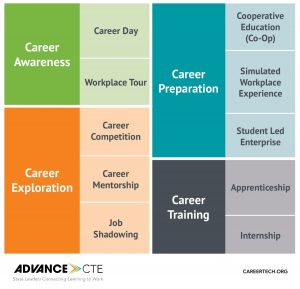
 In workforce development, education and industry partnerships help to align curriculum with industry needs, provide opportunities for real-world experience, and focus on skills over degrees to ensure that learners are not only ready for the workforce but are equipped to thrive in it.
In workforce development, education and industry partnerships help to align curriculum with industry needs, provide opportunities for real-world experience, and focus on skills over degrees to ensure that learners are not only ready for the workforce but are equipped to thrive in it.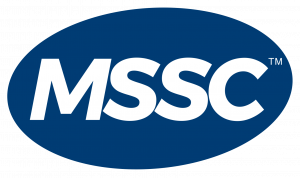 Dear State Career Technical Education (CTE) Leaders and Partners,
Dear State Career Technical Education (CTE) Leaders and Partners, In a world where competition for jobs, pay increases, and academic success continues to increase, certifications offer hope because they are a credible, third-party assessment of a candidate’s skill and knowledge for a given subject. To empower learners with these credentials to succeed, school districts across Illinois partnered with Certiport, helping bring industry-recognized certifications to schools and learners in their communities. Discover how this impacted students and employers in their respective areas.
In a world where competition for jobs, pay increases, and academic success continues to increase, certifications offer hope because they are a credible, third-party assessment of a candidate’s skill and knowledge for a given subject. To empower learners with these credentials to succeed, school districts across Illinois partnered with Certiport, helping bring industry-recognized certifications to schools and learners in their communities. Discover how this impacted students and employers in their respective areas. The National Council for Agricultural Education (NCAE) and the Center for Energy Workforce Development (
The National Council for Agricultural Education (NCAE) and the Center for Energy Workforce Development ( Learners today face immense pressure to find the right path for success after high school. In fact,
Learners today face immense pressure to find the right path for success after high school. In fact, 
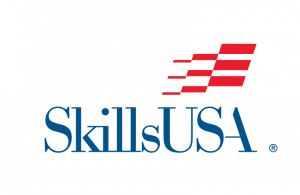 As the leading workforce development organization for learners, SkillsUSA is proud to be leading the way to help America’s future workforce. Approaching our 65th anniversary in 2030, we continue to focus on preparing learners for careers in trade, technical, and skilled service occupations. With the support of over 850 national partners, SkillsUSA is committed to addressing our nation’s workforce challenges with bold solutions and steadfast dedication.
As the leading workforce development organization for learners, SkillsUSA is proud to be leading the way to help America’s future workforce. Approaching our 65th anniversary in 2030, we continue to focus on preparing learners for careers in trade, technical, and skilled service occupations. With the support of over 850 national partners, SkillsUSA is committed to addressing our nation’s workforce challenges with bold solutions and steadfast dedication. 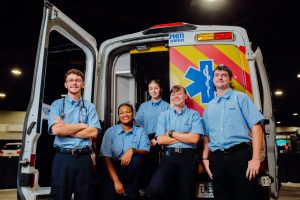
 A New Beginning
A New Beginning